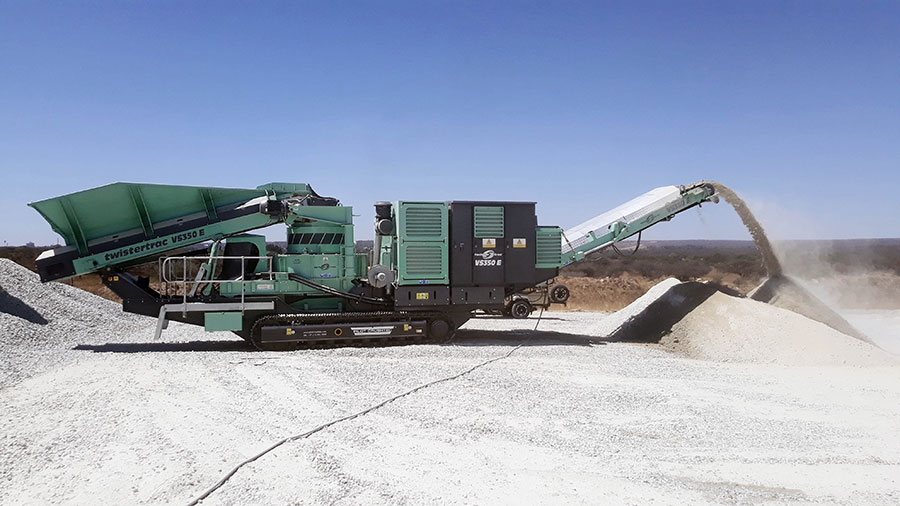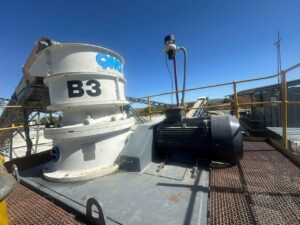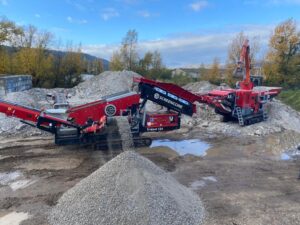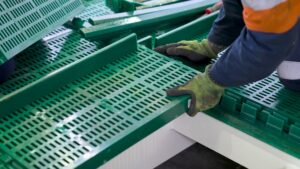Through its own locally made and imported solutions, Pilot Crushtec has over the past 32 years established itself as a leading name in the crushing and screening space. Over the years, the company has played a leading role in shaping the local crushing and screening market to be what it is today – challenging norms and pushing boundaries along the way.
“My father and I started the business in 1990 after he sold his engineering jobbing shop. Having fabricated vertical shaft impactors (VSIs) for the now defunct Austrian company, we had gained experience with crushers. At the time, Nelson Mandela had just been released from prison, so it was the beginning of transformation in South Africa. The mood in the country was positive,” recalls Scherf. “However, there was uncertainty on the business front, and many discouraged us from investing in a new venture at the time. We took the plunge and went on to establish Pilot Crushtec, and never looked back.”
As the company had gained experience in VSIs and seeing a huge opportunity for this type of crusher, Pilot Crushtec launched its own VSI, named Pilot Tornado. Given the antiquated design of all the competitors, the company developed a modular rotor for its newly designed crushers, and at the time this was ground-breaking. The traditional method was to cover rotors with hard-faced welding. The rotor the company designed was bolted together with no need for welding. It also had bolt-on, replaceable wear parts and worked with rock-on-rock pockets.
The rotors performed extremely well in the company’s Tornado crushers. Pilot Crushtec then developed an adaptor to retrofit them into competitor crushers. One of the first Pilot Modular VSI rotors was supplied to Readymix Material (now AfriSam’s Rooikraal Quarry), where it was installed in a Barmac crusher. The transformation in maintenance and wear costs was a thousand-fold. In an application where the old hard-face welded rotor needed two hours of service every day, the Pilot Crushtec rotor went for eight months without any need for maintenance or change of wear parts. Word quickly spread in the market, putting Pilot Crushtec on the map.

Export market
Building on the success of several Tornado installations in South Africa, and testimony to its engineering prowess, by 1993, the company had begun exporting machines to Austria, Croatia followed by South Korea. Eventually, these machines would be exported to more than 20 countries, including Australia, New Zealand, the UK, Germany, Italy, Bulgaria and Serbia, among others.
“Exporting to South Korea was a big achievement, not only for us as a company, but South Africa at large. Given South Korea’s engineering aptitude, it was a ground-breaking moment to have a South African designed and manufactured product achieving success in such a market,” says Scherf.
For its export triumph, Pilot Crushtec clinched successive Merit Awards for Export Achievements at the 1993 and 1994 South African State President Awards. Further success came in 2006 when its fully mobile, track-mounted TwisterTrac won the SA Pro Awards Competition by Product Award, before being granted the Design Excellence Award by the Design Institute of South Africa in 2008.
“We have conceived, designed and manufactured many pioneering products including the introduction of the first fully mobile tracked VSI crusher, the TwisterTrac, and the first ever fully mobile, tracked double roll crusher in the world, the DoppiaTrac DR400,” says Scherf.
That Pilot Crushtec also popularised modular plant solutions is no overstatement. Since the introduction of the Pilot Modular solution in 2005, the company has had great success with it, prompting the popularity of modular plant solutions globally. “We understood that for us to be successful, we needed to offer a solution rather than a product. We created ready-to-run modules, including all stages of crushing and screening, available ex-stock, and this changed market dynamics, not only in South Africa, but globally,” says Scherf.
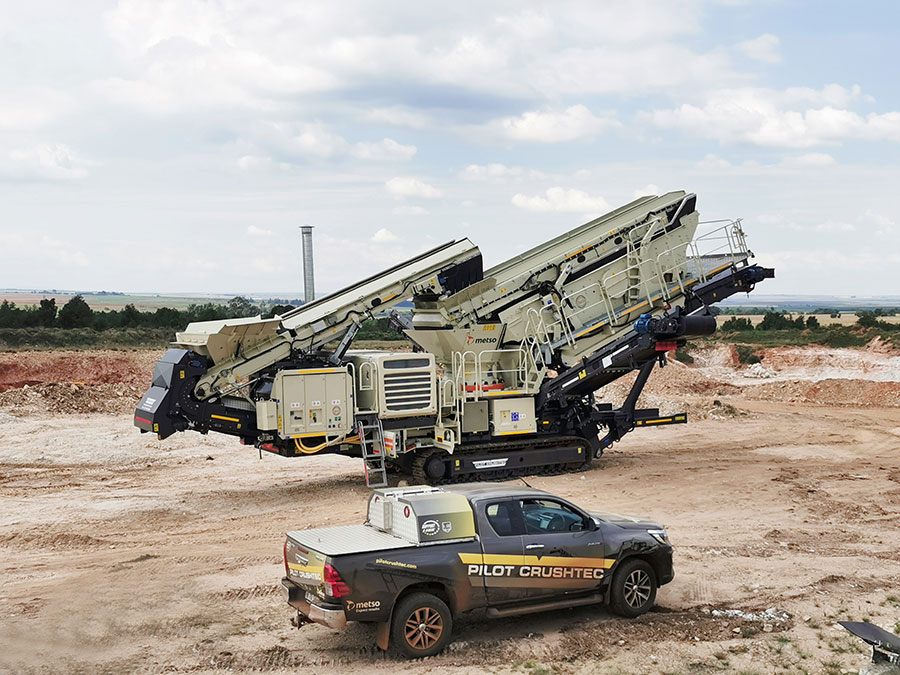
Next big move
After enjoying good success with its Pilot VSI range, the next big move for the company was to acquire the distribution rights of the Finlay brand in 1993. “We initially stocked three machines, which was a gamble at the time because the entire market was only about five units per year, including second-hand machines. Within six months we had sold the three machines and by the end of the year we had put 12 units into the market. That changed the dynamics of the whole market; every supplier in this market started stocking machines, which was a big plus for the industry,” he says.
During its 17-year distributorship spell, Pilot Crushtec sold in excess of 2 000 Finlay machines. The company recorded non-stop growth of 40% per annum on average, right through to 2008, when the global financial crisis hit.
Following the end of its partnership with Finlay, Pilot Crushtec took on the distributorship of Sandvik mobiles in 2013, a relationship that lasted for three-and-a-half years.
A major highlight in the company’s history was the signing of the distributorship agreement with Metso (now Metso Outotec) on 2 April 2016. In September 2017, Pilot Crushtec was awarded the Best New Services Distributor at Metso’s global conference in Finland. The award was for the “exceptional levels of customer service and support”.
In 2019, the company walked away with the Best Sales Growth Award at Metso’s second global aggregates Distributor Days. Testimony to the company’s capabilities, Pilot Crushtec had become one of Metso’s largest distributors globally in just three years.
“Key to our success is the investment in our support structures. We carry between R230-million and R270-million of stock at any given time. About 50-75% of this is stock of wear and spare parts. We have a total of close to 30 000 line items in our system which calls for good inventory management skills,” he says.
Changes in the market
Scherf is of the view that, unlike other sectors of the capital equipment market, the crushing and screening market does not change quickly. “A jaw crusher has not changed much in the past 120 years,” he says. “However, the engineering has been optimised, with weight reduction being one of the notable gains.”
The big change is most apparent in process optimisation, with automation of plants constituting some of the key developments in recent years. Reliability of monitoring technology and the streamlining of the information delivered by monitoring systems are among the big advancements in recent years. Modern systems can provide information that is relevant and that adds value, thus eliminating information overload.
“Another big trend in the market has been the move towards mobile equipment. We have witnessed the dramatic growth of the mobile crushing screening industry in the past 30 years,” says Scherf. The mobile revolution has been accelerated by the growth of the contracting fraternity. Some 30 years ago, recalls Scherf, there were only two big contractors in South Africa. The contracting market has grown significantly and constitutes almost 50% of Pilot Crushtec’s business to date.
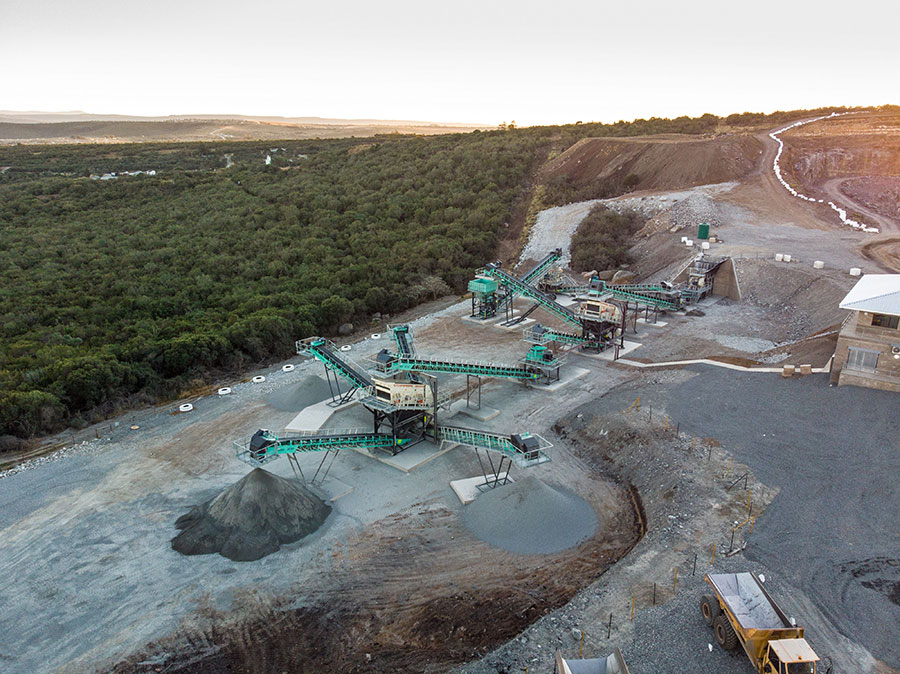
Weathering storms
Thirty-two years is a long time, especially for a business that operates in cyclical industries such as mining and quarrying. “We have weathered many storms along the way,” says Scherf. “The first big challenge for us was the global financial crisis of 2008. We were, however, cushioned by the massive infrastructure spend in preparation for the World Cup. The weakening rand also put us under pressure, but the market was buoyant.”
The biggest crisis for Pilot Crushtec was the 2014 mining collapse, which was exacerbated by the ailing South African economy. “Getting through 2014, 2015 and 2016 was a real challenge. We accumulated losses of almost R60-million during this period, but with grit and determination, a lot of hard work and some sacrifices, we got through it,” he says.
“The market bounced back in 2017, and just when it was moving positively and we were seeing solid growth and positive equity, the madness of the Covid reaction hit us in February 2020. The lockdowns, the resultant supply chain challenges and the rising logistics costs as well as the unprecedented input cost increases presented major challenges. Thankfully it seems, there is some semblance of sanity returning and things are slowly ’normalising’.”
“We had to think differently about business and operating models, risk management frameworks and crisis management to allow for agility at a time when there was a high level of uncertainty. We had to move a number of levers to remain viable,” he says.
In addition, Scherf notes the brain drain is a major challenge for the industry and the country at large. The company has lost five highly experienced technical people in the past three years. As a committed training organisation and to help close the skills gap, Pilot Crushtec has been driving a major technical training programme in association with many of the technical universities. The company recently received an award from the Mangosuthu University of Technology for its role in providing practical experience to students. “We have had 66 students coming though our ranks, 10 of whom have been offered employment,” says Scherf.
State of the market
While the reaction to Covid has subsided, Scherf says the market is nowhere near the pre-Covid levels. The local mobile crushing and screening market has halved in size in the past decade; however Pilot Crushtec has managed to maintain strong market share, especially on the crushing product line.
There is talk of a mining boom, but Scherf believes it hasn’t translated into new capital sales. “We are expecting a good year in 2022, however, the global political environment, especially the Russia-Ukraine war and the talk of a recession in the UK and other European economies, is putting a damper on the potential recovery of the market,” he says.
On the South African front, the political crisis in the country is a serious malaise, harmful to economic performance. However, Scherf is encouraged by the recovery in southern Africa. “In recent years, sales into southern Africa have not been buoyant, but we have seen a strong uptick in enquiries and sales across several markets in the region over the past few weeks, which we hope will offset the downward market trend in South Africa,” concludes Scherf.
